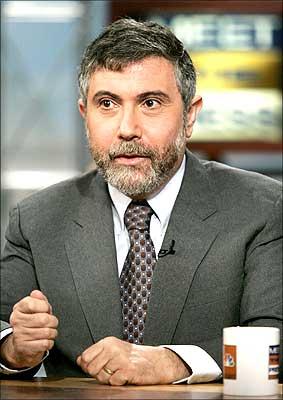 The Royal Swedish Academy of Sciences on Monday announced that American Paul Krugman has won the Nobel economics prize "for his analysis of trade patterns and location of economic activity."
The Royal Swedish Academy of Sciences on Monday announced that American Paul Krugman has won the Nobel economics prize "for his analysis of trade patterns and location of economic activity."
"What are the effects of free trade and globalisation? What are the driving forces behind worldwide urbanisation? Paul Krugman has formulated a new theory to answer these questions," the academy said in its citation.
"He has thereby integrated the previously disparate research fields of international trade and economic geography," it added.
The citation said Krugman's approach is based on the premise that many goods and services can be produced at less cost in long series, a concept known as economies of scale.
Krugman is an American economist, columnist, author, and intellectual. He is professor of economics and international affairs at Princeton University, and is also a columnist for The New York Times, writing a blog and a twice-weekly op-ed column for the newspaper since 2000.
Krugman was born into a Jewish family and grew up on Long Island, and majored in economics (though his initial interest was in history) as an undergraduate at Yale University. He earned a Ph.D from MIT in 1977 and taught at Yale, MIT, UC Berkeley, the London School of Economics, and Stanford University before joining the faculty of Princeton University, where he has been since 2000.
Other awards:
- 1991, American Economic Association, John Bates Clark Medal
- 2002, Editor and Publisher, Columnist of the Year
- 2004, Fundación Príncipe de Asturias (Spain), Prince of Asturias Awards in Social Sciences, the "European Pulitzer"
- 2004, Doctor of Humane Letters honoris causa, Haverford College
He is married to Robin Wells, a fellow professor at Princeton and has no children. He has authored a few books with Wells including Economics: European Edition (with Robin Wells and Kathryn Graddy, Spring 2007); Macroeconomics (with Robin Wells, February 2006); Economics (with Robin Wells, December 2005); and Microeconomics (with Robin Wells, March 2004).
From 1982 to 1983, he spent a year working at the Reagan White House as a staff member of the Council of Economic Advisers. He is also a member of the international economic body, the Group of Thirty.
Technically, the prize awarded in Economics is not a Nobel Prize, as it was not specified in Alfred Nobel's will. It is the Sveriges Riksbank Prize in Economic Sciences in Memory of Alfred Nobel, but is selected by the same committee that selects the physics and chemistry prizes.
It has only been awarded since 1969.
Economics laureates are chosen in early October, and in December the laureates receive their prize.
Nobel Prize consists of a Nobel medal and diploma, and a document confirming the prize amount.
Each 2008 Nobel Prize will amount to 10 million Swedish kronor (2007: 10 million Swedish kronor).
Photograph: Alex Wong/Getty Images





